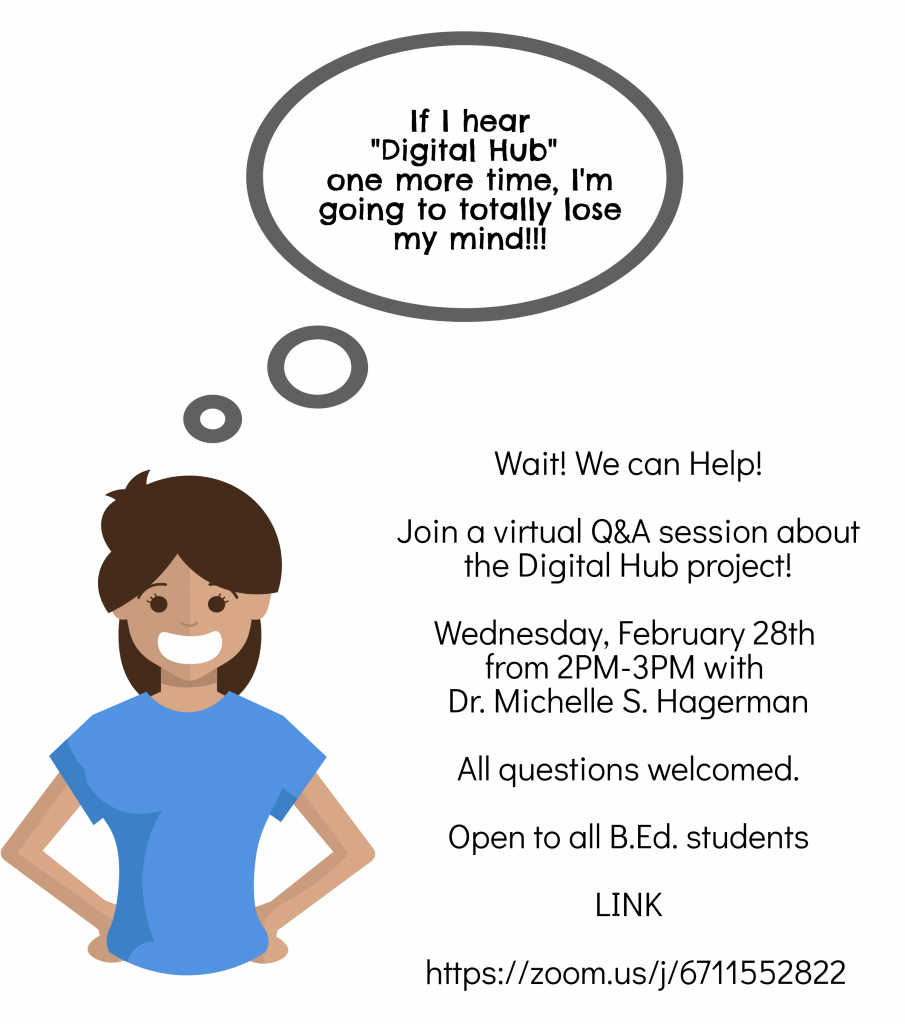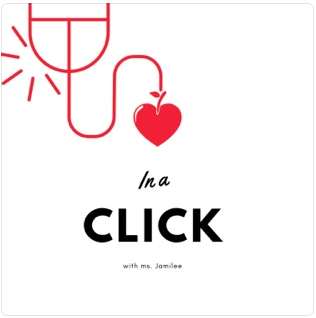
I had the chance to meet up with Jamilee Baroud this week to record an episode for her new Podcast called In a Click. Jamilee is an up-and-coming superstar in the ed-tech/critical digital literacies research community and it has been such a privilege to work with her during her PhD program at the University of Ottawa Faculty of Education. Here’s our conversation — 40-ish minutes of us talking about technologies, research, teaching and learning, deep fakes, embodied cognition, VR, makerspaces…and my first ever research project that helped me to reflect deeply on the complexities of digital technologies, teaching and learning. It as a lot of fun to do this — and I feel really lucky to have been invited onto Jamilee’s show.
I hope you will join me in following Jamilee’s work at In a Click as she shines light online.
Back-to-school means I get to meet another group of new teacher colleagues this week. It also means I get to talk with them about our Digital Hub Strategy in the Faculty of Education and about Making as a promising pedagogical approach. I’ve put together two short presentations on these topics and am sharing them here for anyone interested in the ways that we’re working to support innovative practices and development of advanced professional digital literacies skills at the Faculty of Education at the University of Ottawa.
Digital Hub Strategy Presentation
Key insights from the discussion include:
- B.Ed. students are clearly thinking about the multiple stakeholders who may want to know more about them. They are using their Hubs to communicate with parents, students, colleagues, future employers, the community at large.
- Being on the web in this way raises important questions about the tensions in this practice of open networked sharing. For example, one student asked me — does this mean that as teachers, we are now expected to have a website so that we can be “vetted” by the community openly and in a digital space? In response, I said no — this is not a broadly established or mandated expectation. Neither the Ministry nor the OCT says (in any documents that I know of) that we must have a digital professional presence where examples of our work can be curated for scrutiny by others. I would add that doing this to be scrutinized by others is not the purpose of this work either. That said, teachers have always been held to very high standards by the public. The Hub is one way for us to own our identities in digital networks, and to transparently construct the narrative for others. Do we have to do this, no. However, since many of us already exist online in many ways, this project is meant to offer an opportunity for all candidates to learn new digital literacies skills and mindsets that are fundamental to their practice today, while also asserting some control over the ways that the public can come to know us as professionals. I appreciated this question very much and invite B.Ed. candidates to share their insights with me, and with their professors during the year, as they grapple with how to present their work.
- Reclaim Hosting may be a good option for candidates interested in purchasing a domain name and having their Hub hosted by a third party.
- Google Sites is free to uOttawa students. *Creating a blog with the new Google sites, however, is challenging. You have to create a Blogger account and link it.
- CV: Include one — yes. Please be sure to NOT include your home address and telephone number or email address on your web-based CV, however. You will need two versions of your CV — one for the web and one that you submit for employment (that does include all of that personal info).
- Photos: You will not have media permission to post photos of children on your website. Take photos of yourself teaching, take photos of work (and be sure to talk with your AT about how you plan to use those photos on your website), take photos of backs of heads, learn how to blur out faces using Photoshop, learn how add happy face stickers over children’s faces to protect identities.
- Naming your school on your web-based CV: Since children can be identified through you, please be sure to ask your AT or the principal at your practicum school(s) whether it is okay to name the school explicitly on your web-based CV. It may be enough online to simply state you worked in a grade 7 class in the OCDSB rather than name the school specifically.
- It’s okay to “be human” on your site. Many B.Ed. candidates show things about their interests outside of work as a way to humanize their site and show multiple stakeholders who they are. This also seems to be a way for B.Ed. students to make meaning from the work of curating a digital hub.
Making in Classrooms Presentation
Key Insights from the workshop:
- B.Ed. students drew some kind of visualization related in some way to their area of disciplinary expertise. Some students drew models of processes, others drew abstract images connected in some way to a theme or a concept, others drew procedures. Every image was different. Then, they integrated a simple circuit using a battery, copper tape and an LED light in a way that had meaning.
- After students completed the activity, they walked around to see what others had done.
- As we discussed, students felt this kind of activity supported collaboration, learning through discussion and observation, invited a sense of agency, and felt motivating because it was their own project. They also realized that everyone was engaged at the same time, and that nobody had to do the exact same thing to learn common ideas.
- They also saw that in the images I shared from maker-based learning activities, participants of all ages seemed engaged, proud and happy to be doing the work.
- After the workshop (see slides with research-based findings and links to Maker-based resources in the Ottawa area) I had a great conversation with a student about the potential of maker-based activities for supporting learning that aligns with social justice intiatives. In research that I am doing with colleagues, we are definitely working to see how young children might come to design maker-based solutions to important issues in their school community.
Photos to follow 
]]>
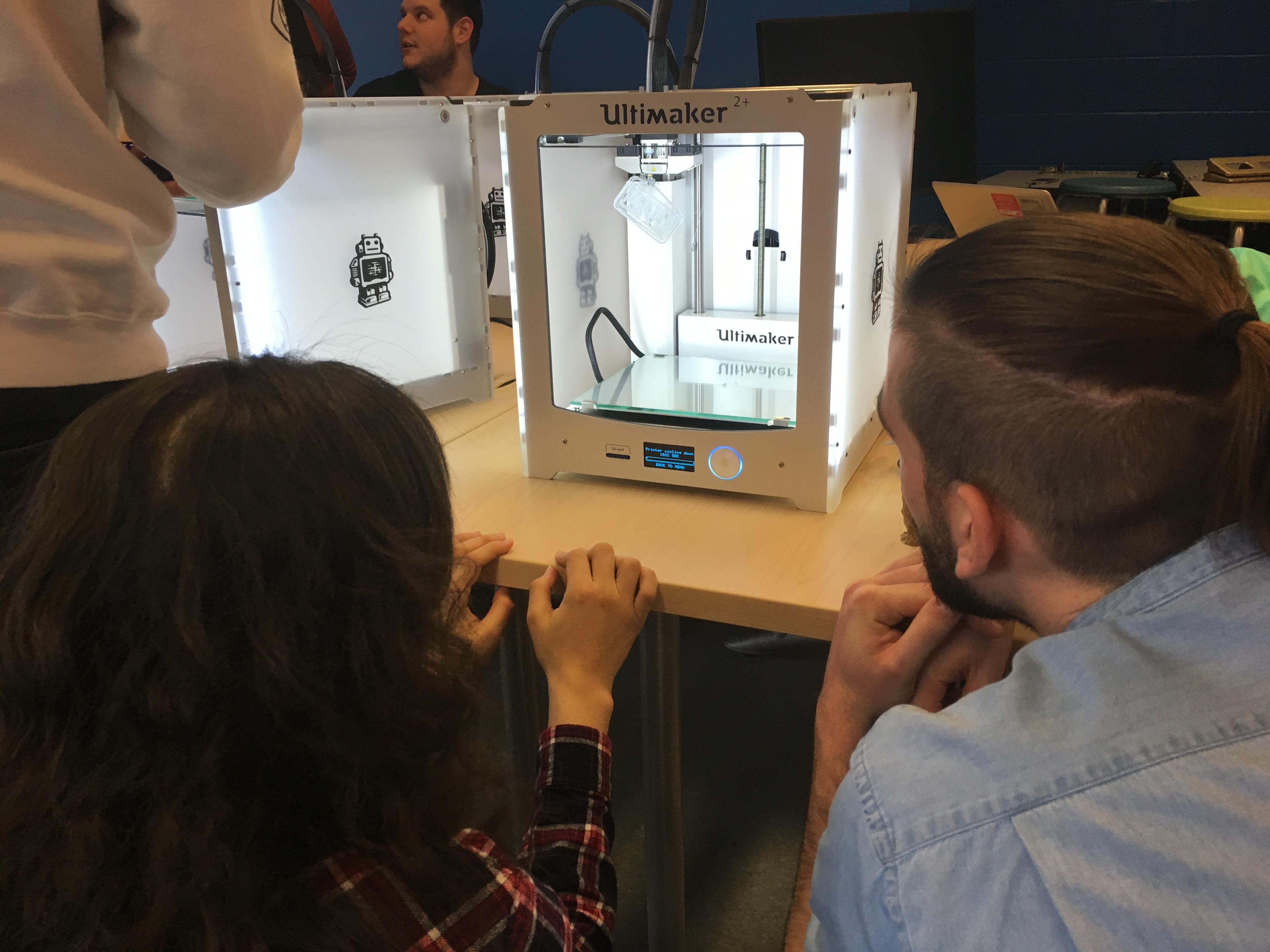 We’ve been lucky, in this class to be able to learn to design 3D objects and print them at the Richard Labbé Makerspace in the Faculty of Engineering. The workshop is always taught by a student engineer and many Education students appreciate the chance to work in a space that is very different from the spaces where they usually work (i.e, classrooms, libraries, coffee shops). As the students design their objects, the conversation turns to pedagogical integrations, applications, aspirations. Here is a list of some of the great ideas we have discussed in our class for projects that integrate 3D design and printing with curriculum expectations.
We’ve been lucky, in this class to be able to learn to design 3D objects and print them at the Richard Labbé Makerspace in the Faculty of Engineering. The workshop is always taught by a student engineer and many Education students appreciate the chance to work in a space that is very different from the spaces where they usually work (i.e, classrooms, libraries, coffee shops). As the students design their objects, the conversation turns to pedagogical integrations, applications, aspirations. Here is a list of some of the great ideas we have discussed in our class for projects that integrate 3D design and printing with curriculum expectations.
Project Ideas
- Identify a real-life problem in the school, that could be solved with the design of some component, and then make it (e.g., do you need hooks to hang up jackets? do you need storage bins for supplies? could you fix something that broke? do you need doorstops?)
- Design projects that require students to each create a component that, when put together, will have a larger purpose and deep connections to a disciplinary concept. Some ideas that students have come up with: Design a game and every person in the group makes a game piece; design a town – the town in which the children live, the town from a book they’re reading, a town that includes all of the things that families need to be healthy and happy — and every student designs a building; design parts of a complex system that can be 3D printed and put together as a group — e.g., a cell, an ecosystem, a clock.
- Design replicas of material artefacts that are connected, in some way, to human activity, or to an historical period. These projects can enable students to empathize with the humans who might have designed these objects in the past, and help students to develop an embodied understanding of human motivations, activities, interests, needs and the design constraints of particular materials, contexts and tools. Further, teachers can invite students to think like archaeologists and historians by having them observe sets of artefacts and abstract key ideas or construct inferences about the ways the artefacts could be used, and therefore about their cultural significance.
- In math, design shapes. Manipulate dimensions — width, length, height. Write about what happens when dimensions change.
- In music, design and create instruments. Manipulate dimensions and consider how this changes the sounds the instruments make.
- Design an object that represents a character, the setting, the plot, or a theme in a novel. Students can share their objects with peers, engage in discussions where other students guess the importance of their object, and then write about their design process as a way to make their thinking and understandings explicit.
- Create a sense of community by inviting each child to design and print a nameplate for their desk, locker, for a wall of names in your classroom.
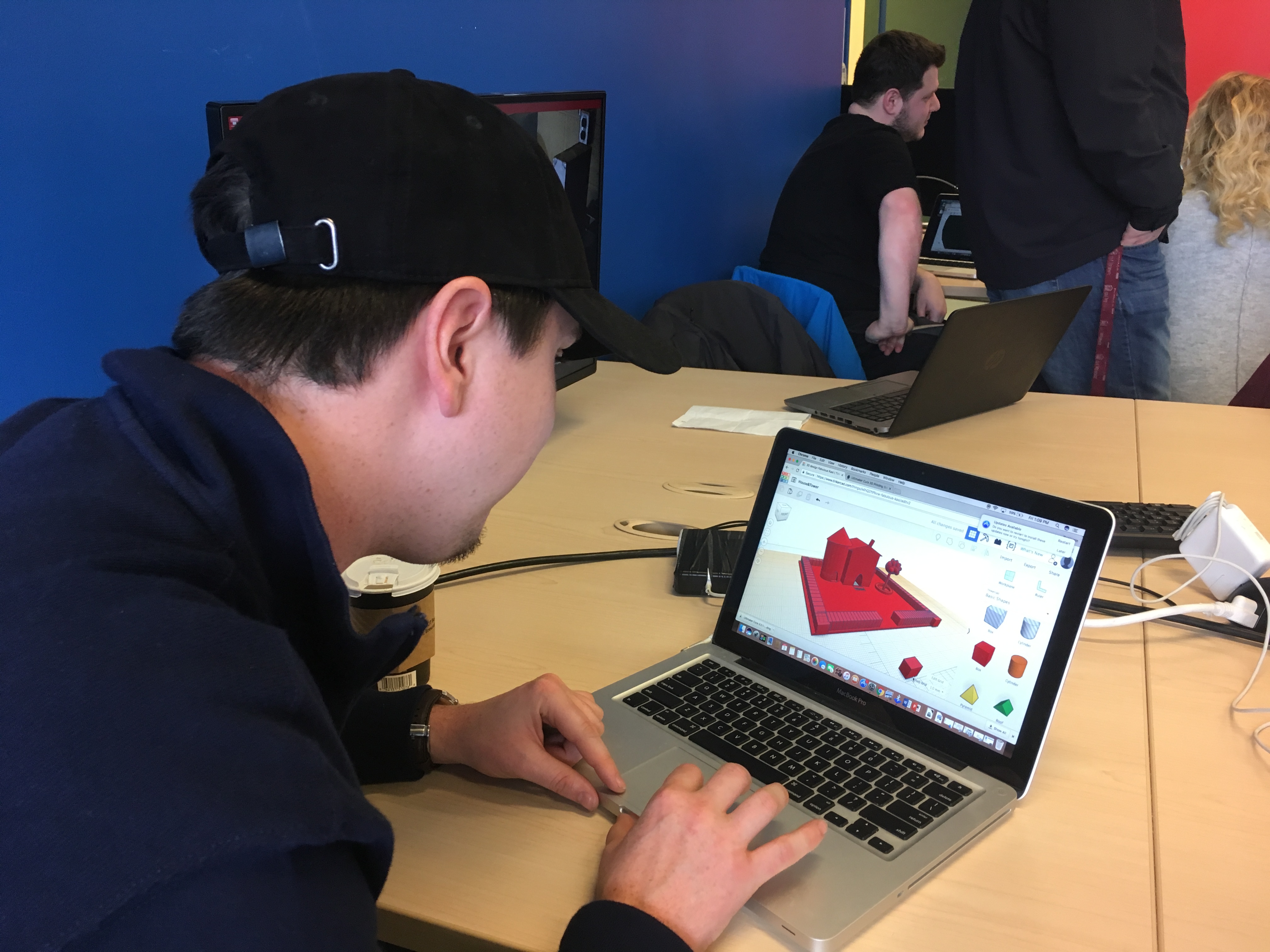
When: Wednesday, February 28, 2018 at 2 PM Eastern time.
Where: https://zoom.us/j/6711552822
]]>
We did all of this work inside of Google Classroom — but today, when I went to access that space, I discovered that my Google Classrooms had disappeared from my institutional account. Without warning. This is one of many reasons that teachers hate technology. Systems and IT policies can undermine the real educational affordances of digital tools. I assumed — erroneously — that my students would always have access to the classroom we built together. And today, I found out the hard way that that wasn’t the case.
So, just in case some of my hard-working students are looking for access to those same resources (Tereza S.?!) here they are — hyperlinked for your use.
Social Media Guidebooks
The Preservice Teacher’s Guide to Social Media in the Classroom
(Created by Intermediate-Senior Teacher Candidates in PED 3119, March 2017)
The Preservice Teacher’s Guide to Social Media in the Classroom
(Created by Primary-Junior Teacher Candidates in PED 3119, March 2017)
Tech Tips with Notes on Effective Pedagogical Integrations
TechTip Synthesis (Intermediate-Senior Teacher Candidates)
TechTip Synthesis (Primary-Junior Teacher Candidates)
Course Syllabus
If you were a member of one of these PED 3119 classes and are looking for other resources, please contact me directly and I will do my best to provide them to you.
]]>
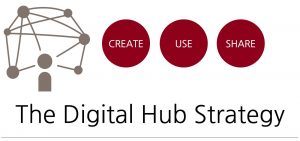
Students in the Teacher Education program at the University of Ottawa will be expected, for the first time this fall, to create a professional website that documents their development as teachers. Faculty members have piloted this project over the past couple of years and in the spring of 2017, we gathered some survey data from graduating students who created professional digital websites in courses and as part of cohort-based initiatives that has helped us to develop a guiding framework for the launch of this project program-wide. Here are some key take-aways from that survey.
- Students tended to think of their digital hubs as an online CV rather than a digital identity text, or as a space for developing new understandings of themselves as teachers through curation, reflection and revision.
- Students wanted more explicit direction from the program about what to include — at least at first.
- Students who created a website did it because they had to as part of a course or because the program was expecting it of them in some way.
- Students told us that, at first, they did not have the technical skill set required for the development of a professional digital hub. Many said they struggled to acquire these skills as they were also learning how to teach.
- Students told us that they needed more support around issues of identity management, privacy and how to ethically and responsibly share their work and their students’ work on the open Internet.
Students entering our program this year will learn, at Orientation, about the Hub, its purpose, and the rationale driving our programmatic choice to integrate it as part of their professional preparation program. Broadly, we see the Digital Hub as one way for teacher candidates to develop foundational professional digital literacies skills while also curating a set of documents that reflect their emerging skills, values and competencies as teachers and teacher researchers.
Information about the Digital Hub initiative can be found at http://sites.google.com/site/edtechuo
This site is for students, but also for Faculty members looking for tips, strategies and resources to support their students’ emergence as digitally literate professionals.
]]>Je vais présenter aujourd’hui (le 29 mai) les analyses que j’ai faites avec mon collègue et assistant de recherche, Kamal Imikirene, à la réunion de la Société canadienne des études en éducation.
Voici les diapos.
]]>
